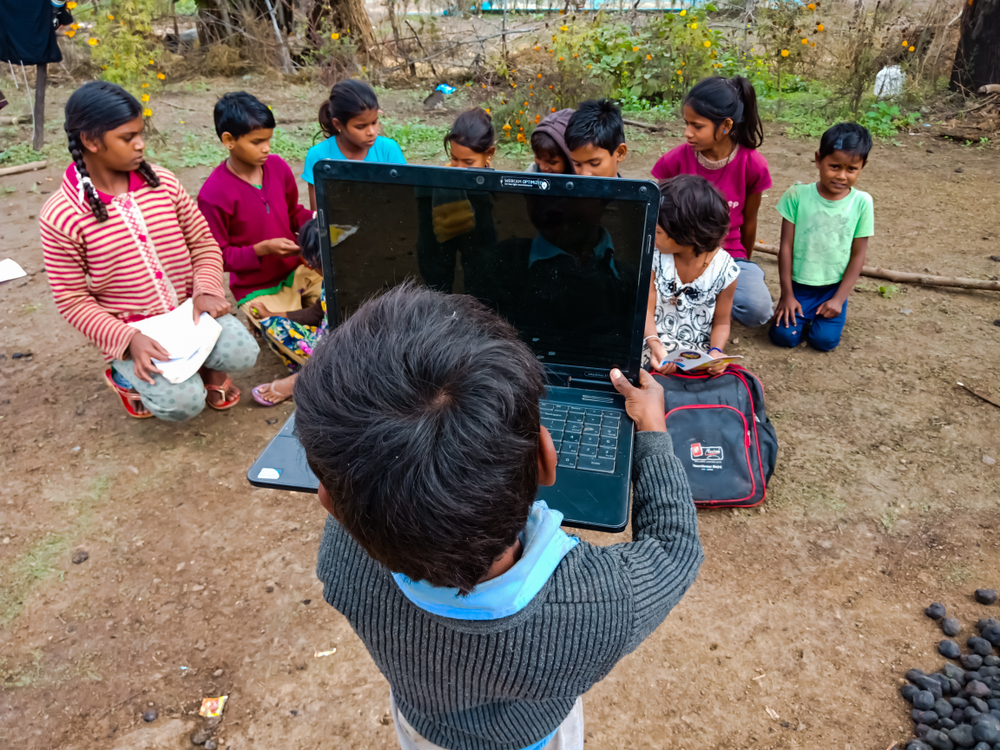The government of India (GoI) has been pushing for online solutions to the crisis faced by the schools and univeristies as a result of the lockdown. The online solutions are exclusionary as they restrict the participation of students from disadavantaged sections and strengthens the existing inequalities. All India Forum for Right to Education (AIFRTE) criticizes the move towards online learning through its recent report titled, ‘GOI moves towards Online Learning.’ The report identifies the digital move in education as a part of the larger neo-liberal agenda of the government evident from its policies of privatization of education and fee hike. It argues that online learning may lead homogenization of education, hamper creativity and strengthen the existing inequalities in our society. The following is an extract from the report.

GOI is using the Covid-19 crisis to push through a policy for promoting the corporate and investor- friendly `e-learning’ alternative without a critical nation-wide debate to identify and evaluate its pedagogical limitations. These limitations make it suitable only as a supplementary means in an adequately functioning formal system of education. Educationists do not respond favourably to `e-learning’ as an alternative system since it is far less effective than the collective physical participation possible in an actual classroom in generating a teaching-learning environment conducive to a creative, critical and discursive engagement between teachers and students.
Let us look at the constitution of the virtual classroom. Who gets `invited’ to join it? And who does not even merit an `invitation’? Who is unable to accept the invitation? The choice is neither that of the teacher nor that of the student. It is determined by whether one has access to or owns the appropriate technological device and internet connectivity. Within the virtual classroom the socially disempowered, less vocal invitee is further marginalized and feels disconnected because the space for interpersonal interaction has shrunk. Finally, the lack of conducive space at home for undisturbed online learning and the lack of a timely availability of devices for all children at different stages of education in the family are crucial absences of necessary “resources” that increase anxiety and tensions for financially insecure students .
The basic assumption underlying the universalizing of e-learning is that every student, or parent, has uninterrupted access to Internet and each student, or parent, possesses a resourceful gadget for the same. This assumption is not only unfounded but also hazardous for the future of education. For the e-classroom does not aim at the ‘universalization’ of education, but only of the consumerist aspiration for acquiring uninterrupted Internet access and ownership of appropriate gadgets.
The homogenization of learning, and indeed of knowledge itself, is a global feature of the commercialization of education. Education is becoming a means to profitably recoup through market mechanisms the investment made either in providing or in acquiring it. This is the era of the “merchandization” of education which is now required to conform more closely to the needs of the market and so initiate its own transformation into a new and highly lucrative market. Private tutoring, private institutions with private managements, and online learning, the technological `cherry’ on top of the cake of global Education Business characterize this edu-market.
Knowledge as a resource for critically comprehending our world, society and cultural value systems is now regarded as “too heavy” for contemporary learning methodologies. The “skills approach”, an integrated and functional assembly of know-how, personal behaviour qualities that facilitate “team-work”, and encouraging individuals to adapt and solve problems in changing situations, is being promoted as the preferred option. However, since it lacks an adequate knowledge base this “new knowledge” will end up restricting those who acquire it to remain confined throughout their lives to basic competencies – mastering a new software, using a new machine, adapting to a changed working environment. This knowledge involves a deliberate reduction of “one’s being to the condition of a cog in the techno-economic machine”.
This process increases profits for investors, but severely hinders cognitive interests which are blunted. A tedious conformism in thinking diminishes creativity and discourages change. A new pedagogic and political culture of silence and suppression of dissent is thereby created.
Lock-down under the Covid-19 pandemic is being used by governmental and private agencies and institutions to promote distance teaching, learning and evaluation in virtual modes: schools, colleges, universities and regulatory authorities like the provincial Directorates/Departments of School Education and the UGC etc. Teachers are being asked to organize virtual classes to ‘complete the syllabus’ even during this emergency situation. Directions for organizing online exams are being issued despite overwhelming opposition from students and teachers in several universities.
Universities are organizing webinars and online conferences where private universities are being associated and advertised and persons from industry are being given a prominent role. Distance education in Digital mode is being promoted by different corporate enterprises and the media today. Home-based schooling is being glorified. The pandemic is being utilized by global companies to tell us that India can afford to provide primary education through virtual technology itself. It is being proposed not merely as an interim solution, but as a viable substitute for conventional face-to-face, interactive education.
Read the report here
AIFRTE Report on OnlineLearning 10th August 2020




